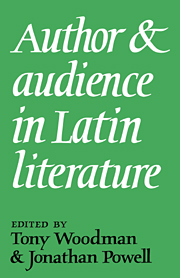Book contents
- Frontmatter
- Contents
- List of contributors
- Prologue
- 1 THE ORATOR AND THE READER: Manipulation and response in Cicero's Fifth Verrine
- 2 STRATAGEMS OF VANITY: Cicero, Ad familiares 5.12 and Pliny's letters
- 3 ‘SHALL I COMPARE THEE…?’: Catullus 68B and the limits of analogy
- 4 ATOMS AND ELEPHANTS: Lucretius 2.522–40
- 5 IN MEMORIAM GALLI: Propertius 1.21
- 6 THE POWER OF IMPLICATION: Horace's invitation to Maecenas (Odes 1.20)
- 7 THE VOICE OF VIRGIL: The pageant of Rome in Aeneid 6
- 8 FROM ORPHEUS TO ASS'S EARS: Ovid, Metamorphoses 10.1–11.193
- 9 POET AND AUDIENCE IN SENECAN TRAGEDY: Phaedra 358–430
- 10 PERSIUS' FIRST SATIRE: A re-examination
- 11 NERO'S ALIEN CAPITAL: Tacitus as paradoxographer (Annals 15.36–7)
- 12 AMOR CLERICALIS
- 13 EPILOGUE
- Notes
- Abbreviations and bibliography
- Indexes
5 - IN MEMORIAM GALLI: Propertius 1.21
Published online by Cambridge University Press: 13 March 2010
- Frontmatter
- Contents
- List of contributors
- Prologue
- 1 THE ORATOR AND THE READER: Manipulation and response in Cicero's Fifth Verrine
- 2 STRATAGEMS OF VANITY: Cicero, Ad familiares 5.12 and Pliny's letters
- 3 ‘SHALL I COMPARE THEE…?’: Catullus 68B and the limits of analogy
- 4 ATOMS AND ELEPHANTS: Lucretius 2.522–40
- 5 IN MEMORIAM GALLI: Propertius 1.21
- 6 THE POWER OF IMPLICATION: Horace's invitation to Maecenas (Odes 1.20)
- 7 THE VOICE OF VIRGIL: The pageant of Rome in Aeneid 6
- 8 FROM ORPHEUS TO ASS'S EARS: Ovid, Metamorphoses 10.1–11.193
- 9 POET AND AUDIENCE IN SENECAN TRAGEDY: Phaedra 358–430
- 10 PERSIUS' FIRST SATIRE: A re-examination
- 11 NERO'S ALIEN CAPITAL: Tacitus as paradoxographer (Annals 15.36–7)
- 12 AMOR CLERICALIS
- 13 EPILOGUE
- Notes
- Abbreviations and bibliography
- Indexes
Summary
Tu, qui consortem properas euadere casum,
miles, ab Etruscis saucius aggeribus,
quid nostro gemitu turgentia lumina torques?
pars ego sum uestrae proxima militiae.
sic te seruato possint gaudere parentes,
haec soror acta tuis sentiat e lacrimis:
Gallum per medios eruptum Caesaris ensis,
effugere ignotas non potuisse manus;
et, quaecumque super dispersa inuenerit ossa
montibus Etruscis, haec sciat esse mea.
5 ut post seruato MSS, om. mss; del. mss, Pucci.
6 haec mss, Pucci, Beroaldus; ne MSS; nee mss.
7 eruptum DuQuesnay; ereptum MSS; elapsum Markland.
9 et MSS; at Ayrmann; sed Enk; nee Butler.
You, soldier, who, to avoid being a partner in my fate, are hastening wounded away from the Etruscan siegeworks, why, at the sound of my groaning, do you roll your eyes so that they bulge? I am the one among your fellow-soldiers most closely related to you. On this condition I wish that your parents may be pleased at your safe return, namely that your sister should learn from your tearful account that this is what happened: Gallus, having broken out right through the midst of Caesar's blades, was not able to escape unknown / ignoble hands ; and, whatsoever bones she finds scattered over the surface in the Etruscan mountains, let her know that these are mine.
- Type
- Chapter
- Information
- Author and Audience in Latin Literature , pp. 52 - 83Publisher: Cambridge University PressPrint publication year: 1992
- 14
- Cited by

